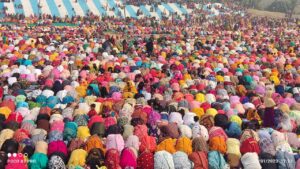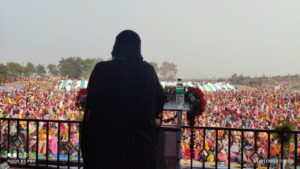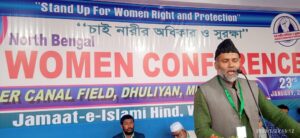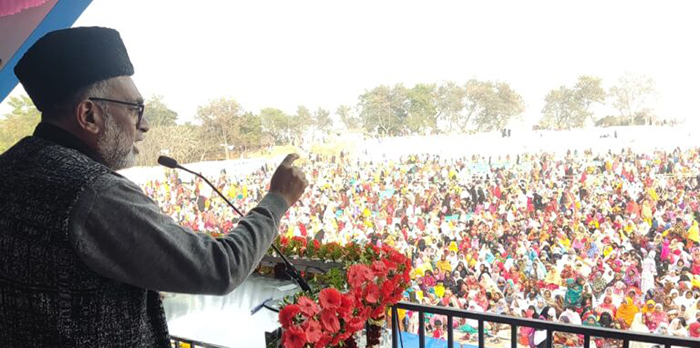NE NEWS BUREAU
KOLKATA, JAN 27
A huge crowd of women belonging to different faiths turned up at two public meetings in Kolkata and Murshidabad organized by the West Bengal unit of Jamaat-e-Islami Hind (JIH) on January 22 and 23 on the theme of protecting the rights of women.

Prominent among those who addressed the two public meetings included JIH vice-president S. Ameenul Hassan and Atiya Siddiqua, secretary, All India JIH (women’s wing).
Mr. Ameen, in his speech, discussed the present position of women in India and the duties of Muslim society to ensure the rights of women as described in Islam.
He started with the gory incident of Delhi where a young lady, Anjali Singh was dragged by five men in their care for twelve kilometers in the most inhuman and utterly despicable way. He alleged that those who raise the slogan of Beti Bachao Beti Padhao did not play a commendable role in that case ‘because one of those five was a member of their party.’
He termed that slogan as mere Jumla. He elaborated that if they find anyone from their party accused of murder or rape case, they dilute the case. He asked, “Is Bilqis Bano not a Beti? Was she not raped by fourteen beastly men? Have they not been released? Were they not garlanded?”
He recalled the Harthras case where on Dalit girl was raped and beaten so mercilessly that she could not survive.
He stated, “If the victim is from Dalit or Muslim community or the so-called lower castes and the perpetrators are from the upper castes or the ruling party all the cases of violence against women get diluted.”
Mr. Amin asked the audience what to do in such a situation and then he answered, “Don’t expect much from those who make laws. Recently a newsmagazine reported that even MPs or MLAs are charged with heinous crimes. BBC reported that out of 10 million cases registered last year, half a million were related to violence against women. Theoretically, we can say many things but practically the situation of women is miserable.”
He explained the reason for such a situation telling, “Because women are considered a lesser being. When a girl child is born, even women show their displeasure. Even the father of the girl delays his arrival to see her. This ill-thought is still prevalent in our society which was denounced in Holy Quran more than 1400 years back.”
He expressed his deep concern that this unfortunate scenario is found in even Muslim society “while Quran says that both men and women are equal in their rights and rewards.”
He elaborated that one can see the equality mentioned in Islam in getting birth, education, job, and choosing a spouse- both men and women have equal rights. However, he added, “Of course, the duties of men and women are different as roles and responsibilities can be different.”
He discussed the exploitation of women at different levels. He alleged that cases of sexual assaults against women by their bosses are reported even in the media houses. “Women are trafficked to big cities. Then they are killed in the name if women decide to choose a spouse different from the choice of their families.”
He detailed the provisions of protection of women in Islam referring to one separate chapter called Surah Nisa and also Surah Maryam.
Mr. Ameen referred to the record of early marriages in some parts Bengal and opined that one should ensure that girls are not denied their education and their health was not compromised.
He asked both men and women to take a pledge to educate the daughters, to empower them financially. He urged, “Take a pledge that we will give our daughters the best upbringing. We will not hurt them emotionally or otherwise. Don’t forget our daughters can become like Bibi Fatima, Bibi Khadija and Bibi Ayesha.”
He also asked the women to unite and forge groups to ensure that there was no violence against women. He concluded with caution, “Don’t expect men will fight for you. You will have to fight for yourselves on your own.”

Atiya Siddiqua, secretary, All India Jamat e Islami Hind women’s wing in a wide-ranging speech told the audience that while women are fighting for their rights it is also a harsh reality that they are being exploited in their homes to their offices. She said that women are either extremely uncontrolled or totally controlled while what we need is a middle path.
She said that confining women to their homes and to give birth only was not the Islamic way. “Our women too used to get satisfied with this but after getting educated they realized their potential and started contributing to society”, said the learned speaker from her dais.
She elaborated, “Islam’s middle path has not allowed extreme freedom that affects women’s femininity but sets some limitations and guides to contribute to society in a better way. It is important that women knew their rights and duties. Both rights and duties are mentioned in Islam as our Creator knows the best.”
In the period of Prophet Mohammad (PBUH), she told, we see that women were actively participating in many fields like business, education and teaching. She said, “women played their role in the battlefields and they were allotted special places in the mosques.”
She showed her disappointment stating that today women are allowed to go everywhere but they were not allowed to go to mosques to learn Islam by local people. She demanded that women be allowed to go to Masjids to know about Islam and learn teachings about our family issues wherever it was possible. She appealed, “Let us take our issues to our Ulema, instead of going to the courts.”
“In the population women are half but as influencers, they are more than that because both men and women are influenced by them in upbringing. Children in a woman’s lap are totally under her control. They can mold a son or a daughter in the best way”, she explained.
She told not to discriminate between a daughter and a son and groom both physically and spiritually with equal attention.
She emphasized the need to bring out the talent of women in a better way and spread education among them.
She said, “We have to see as women what we can do at a personal level to make this society better. If everyone tries to perform better at a personal level, you will see that we have better homes and societies.”
She said that it is better that women are educated and if for some reason they are not, they may learn from their daughters, sons and daughters-in-law.
She highlighted the importance to know the happening in the surroundings. She cited the triple talaq issue which she said, “has been used as a political tool” but opined that this menace must be addressed. She told the huge gathering to keenly look in and around if there is an issue related to divorce and facilitate an Islamic solution.
She formulated this idea, “Those women who are well-versed in Islamic and modern education may start counseling centres in the mohalla and then in bigger centres. At those centres we can address and resolve the disputes between husbands and wives and other family members ensuring that no one is denied from his/her rights.”
She also suggested arranging pre and post-marriage counseling for young girls, so that, they knew the provisions of marriage and divorce and inheritance etc.
She said that men usurp the rights of women but unfortunately women too are found to be guilty of this.
She expressed her disappointment for not being a model society with Islamic ways of life which people could see as an adorable place where women get their full rights. She persuaded the women and men to establish such a society.

JIH West Bengal secretary Shadab Masum informed that the state chapter convened two mass congregations in Kolkata and Murshidabad for women of all faiths to raise a voice for women’s rights and their protection.
In this programme, the other speakers were local MLA, principal women’s College, Human right activist and state jamaat leaders.
Apart from JIH Vice President and Mrs. Atiya Siddiqua, JIH West Bengal President Maulana Abdul Rafeeq, noted imam who leads the Eid prayers at Red Road in Kolkata, Maulana Qari Fazlur Rahman, former JIH state presidents Mr Rahmat Ali Khan and Mr. Muhammad Nuruddin also spoke on the occasion. Maulana Tahirul Haque, Nr.Sadab Masum, All India Muslim Majlis-e-Mushawarat’s Mr.Abdul Aziz, state head of APCR Mr.Abdus Samad, state secretary of Sadbhavna Manch Sheikh Taheruddin, Mizan weekly’s editor Masihur Rahman, former TMC MP Mr.Ahmed Hassan Imran, Bandi Mukti Committee’s (Prisoner relief committee) Secretary Choton Das, state presidents of SIO and GIO Mr.Saeed Mamun, Ms.Sharifa Khatun were present on the occasion.
(With special arrangements with indiatomorrow.net)









